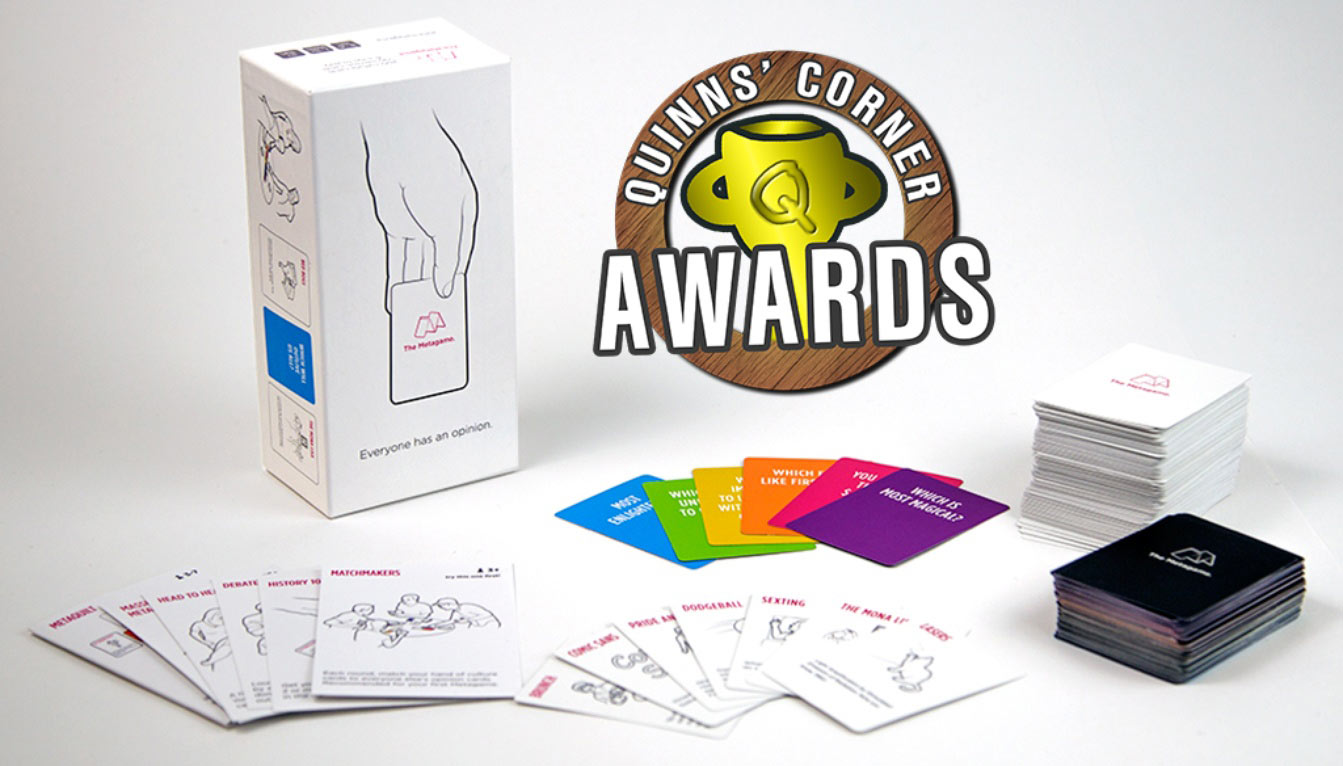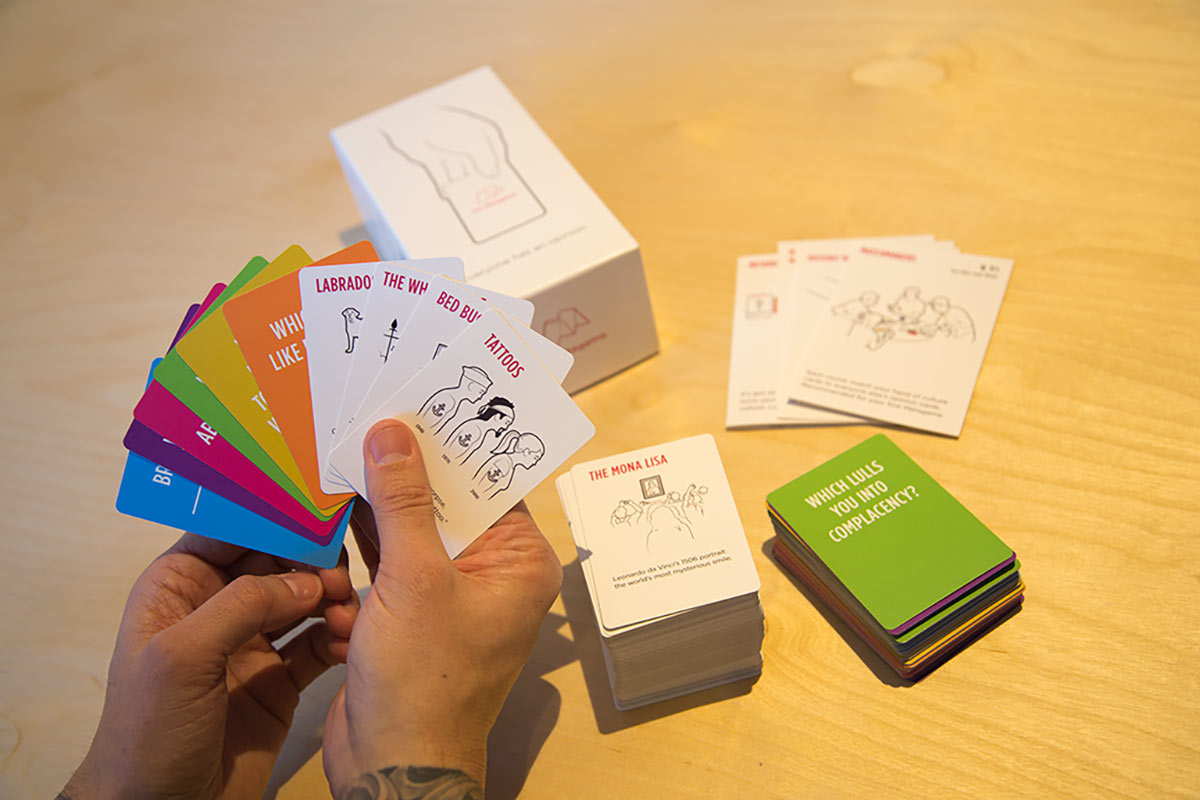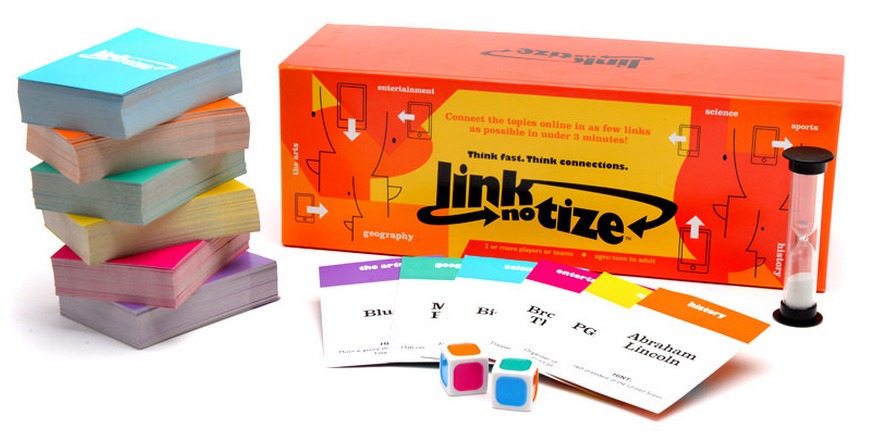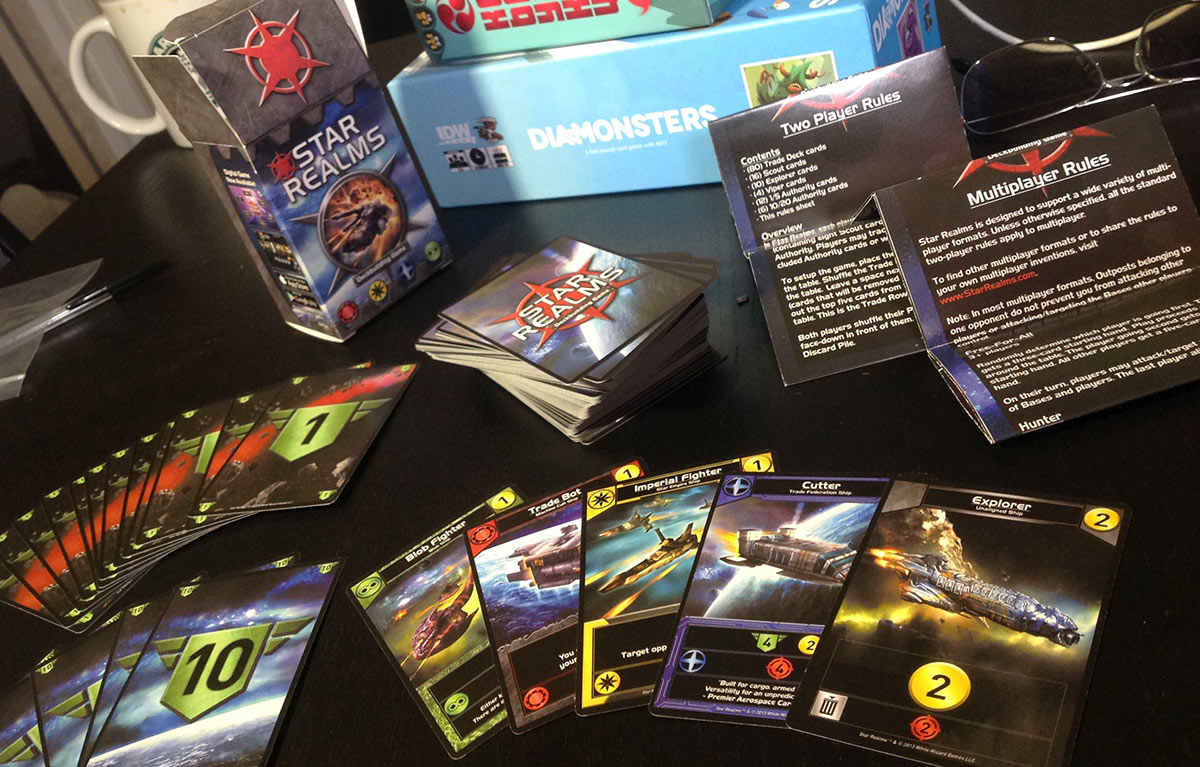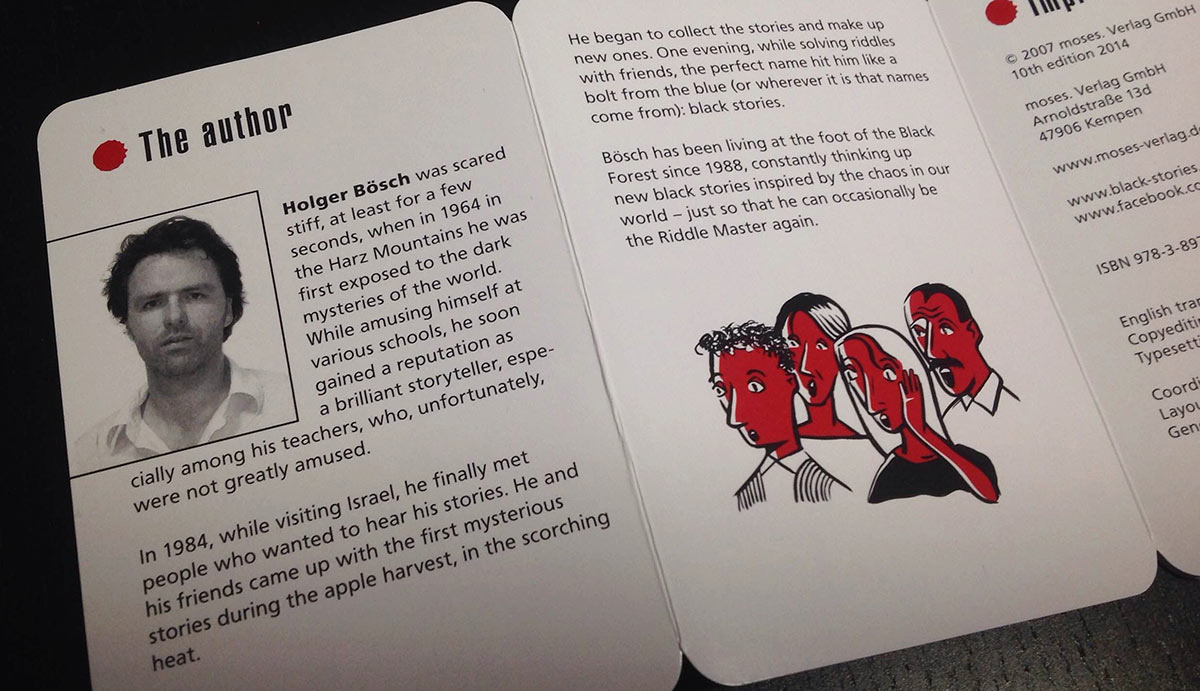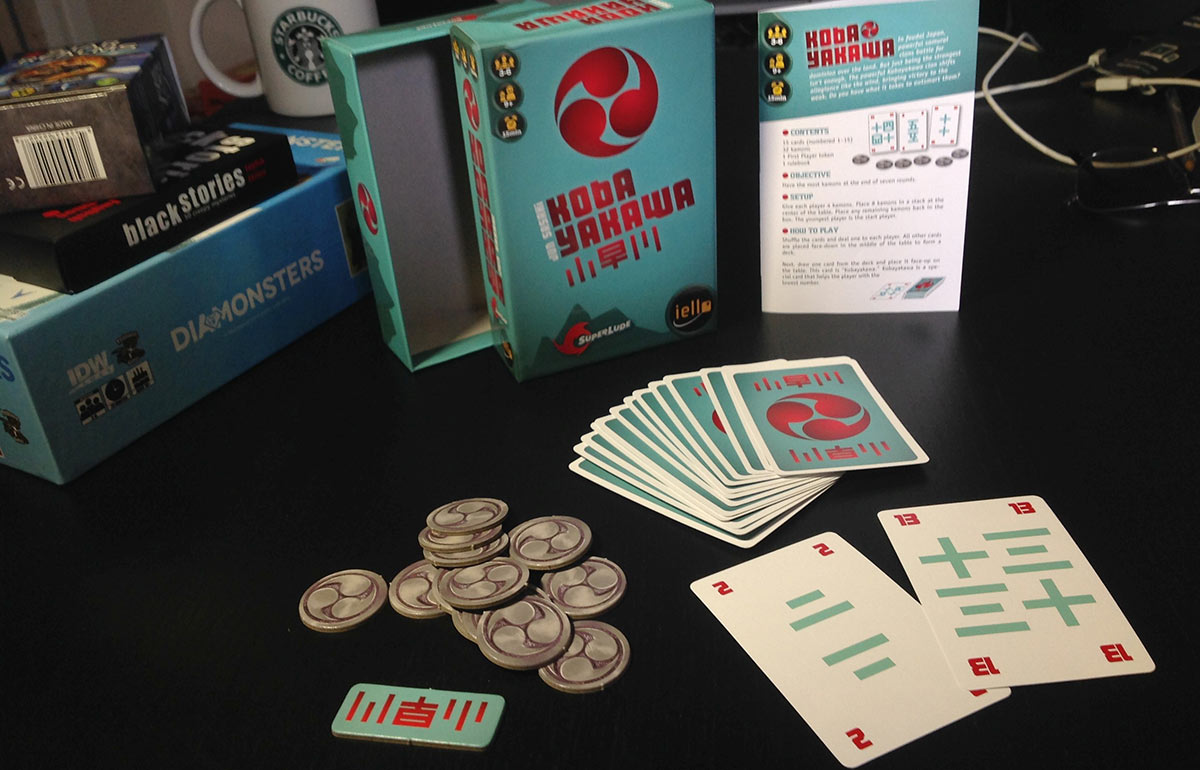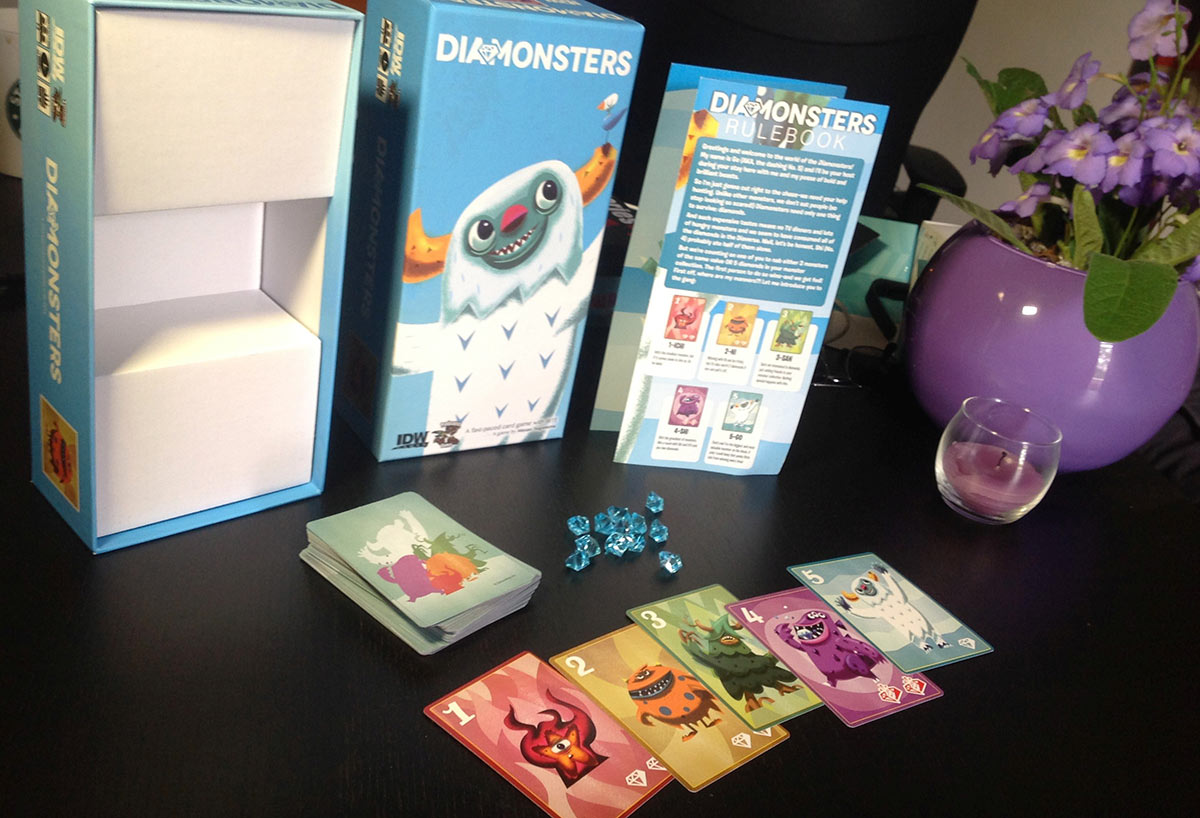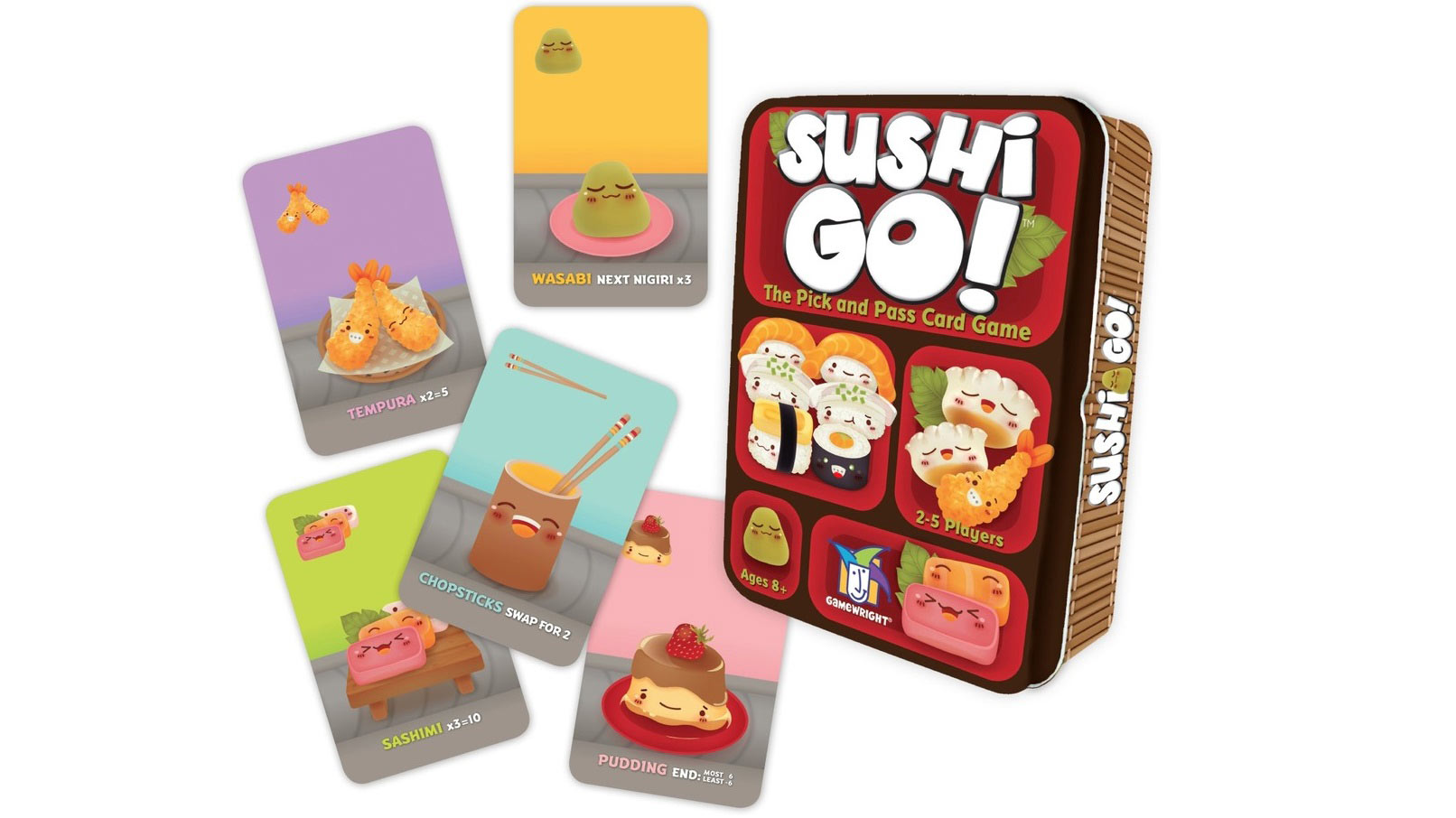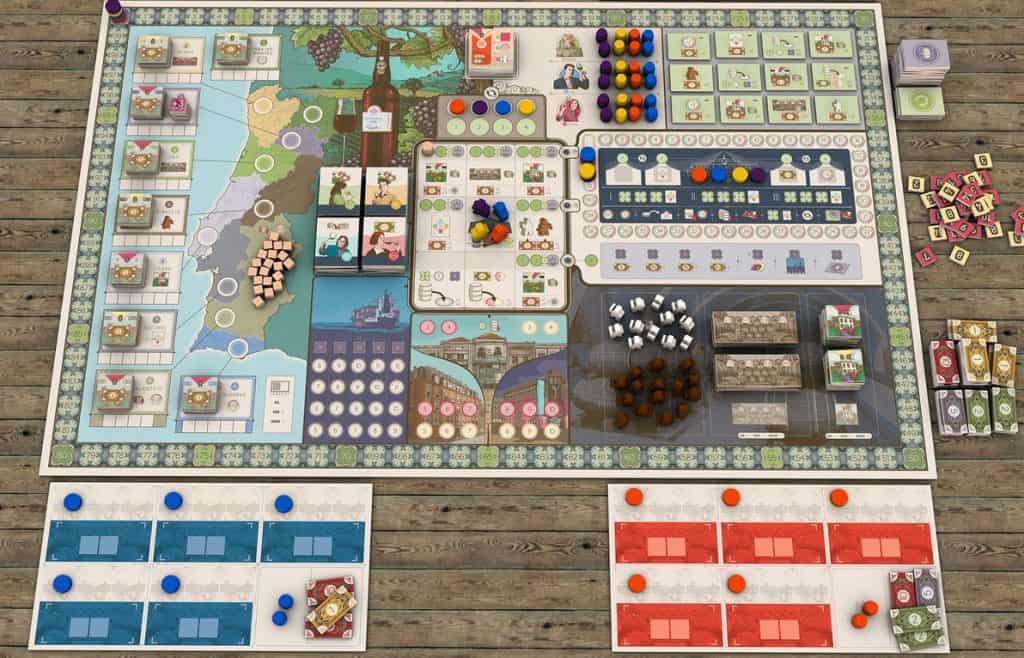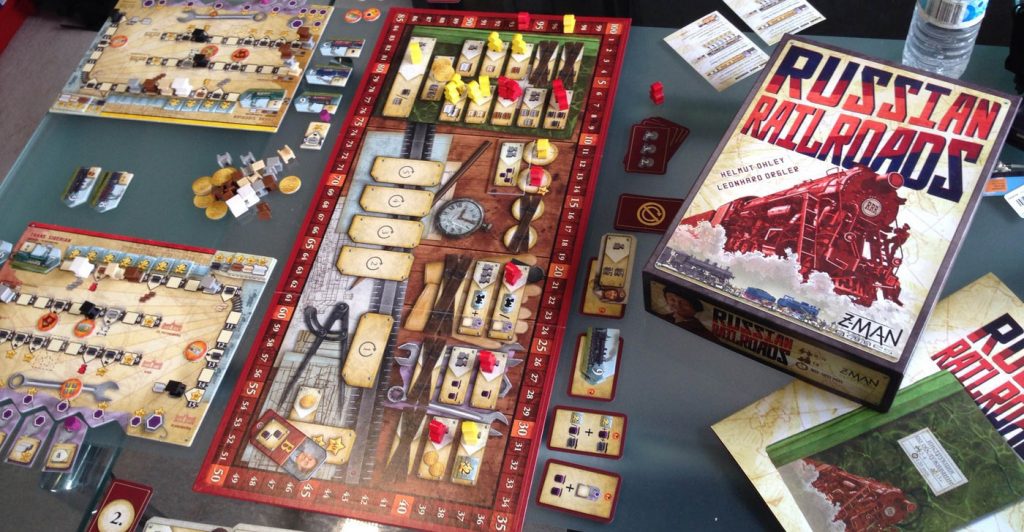Quinns: Hello everybody! Take your seats, the show’s about to begin.
We get sent twice as many games as we review on SU&SD. We cover the good games and set fire to the bad ones, but there’s a sort of purgatory in between of games that don’t get reviewed and pile up in my corner.
Maybe a game’s too interesting for me to burn it. Maybe it’s too similar to something we just reviewed. This is what lead to 2013’s Rapid Review Special Episode– a big, weird release valve of a video that let me reclaim my corner for a hot minute and put a pot plant there.
That time has come again. Today, SU&SD is proud to present no less than seven reviews of the best and weirdest games to be found in my corner.

The Metagame is a stunning box that got a quick recommendation at the end of our Cards Against Humanity article. As of this week it’s available internationally here, and our American readers can still grab it from Amazon here. Two bits of trivia: One, an early version of The Metagame was actually a source of inspiration for Cards Against Humanity. The commercial release just took years to get here. And two, The Metagame was co-designed by Eric Zimmerman, who’s no less than the sparkling mind behind lovely space-dice wargame Quantum.
What is The Metagame?
It’s a quiz game except instead of facts, you’re playing with opinions. In the box is a fat stack of cards with statements or questions like “This would make the weirdest fetish ever,” or “Which is the most magical?”, an even taller stack of beautifully illustrated cards with things on, from Tron to Enron, and seven different manuals for seven different games!
“Matchmakers” plays like Dixit or Cards Against Humanity, with players playing cards from their hand to answer questions, and the best answer wins. “Debate Club” is the same but a la Snake Oil, you can argue your point. “History 101” uses the fact that all the cards have dates on them to turn The Metagame into Timeline, a game I love. And most impressively of all, “Massively Multiplayer Metagame” creates a game that can be played concurrently with a party, with anywhere from six to fifty players wandering around with their cards in their pocket, challenging one another whenever they like, with the winner claiming the card the loser played.
It’s a clever idea, it’s a beautiful box, it’s peerlessly modern, and it’s generous to the point that you’re practically buying a format for games instead of a game. Oh, and it works. You can’t play this game without having funny arguments and interesting discussions.
Shut Up & Sit Down categorically recommends The Metagame. Head to the beautiful official site if you want to know more.

Linknotize is a very fancy party game sent to me by a very fancy marketing department. In this modern age of young people being better at sifting through large quantities of information than retaining facts, what if we replaced Trivial Pursuit with a game of travelling between information?
In other words, Linknotize is a game where players have to navigate Wikipedia as quickly and cleanly as possible, using only hyperlinks in the pages. So, you might be challenged with navigating between the American Civil War and Seinfeld in six links.
I thought that was kinda cool, but the instant it arrived I saw the giant, dangling problem with it. Most party games involve watching your friends perform a task. In this one, you’re watching your friends silently use their phone. For minutes.
Can you think of anything worse? Don’t answer that.

Star Realms is a silly name for such a tiny box. Imagine if a tiny man came up to you and told you his name was Star Realms. You’d laugh him out of town!
Except the joke would be on you, my friend, because Star Realms is from the co-designer of Ascension and is a profoundly fun, profoundly lightweight deckbuilding game in the style of (yes!) Ascension, or Dominion or Arctic Scavengers, except it plays twice as fast as any of ‘em.
You start with a tiny deck of crap space ships, on your turn you deploy those ships to chip away at your opponent’s health and buy more ships from a central market, and slowly develop your deck into an (maybe?) deadly machine focused (probably?) on one of the game’s four factions.
It’s very strange. You get all the satisfaction of Dominion without having to think at all. You got attack ships? BANG BANG BANG your opponent discards some health cards. Got money? QUICKLY GRAB GRAB GRAB the ship with the funniest name. No cards left to draw? MMMMM SHUFFLESHUFFLESHUFFLE your lovely little shiny discard pile into a shiny shiny deck.
Enjoying yourself? OOOOH ORDER EXPANSIONS because they’re available as slim little booster packs and they’re so cheap. Not playing Star Realms? SOMETHING’S GONE WRONG get some friends over and start playing Star Realms.
Seriously. It even has rules for free-for-all multiplayer, teams, teams with captains, all vs. one or a strange kind of clockwise aggression. We’re sorry we ever doubted you, Star Realms. You’re the best thing to come out of Massachusetts since the Kennedys.

Oh god. I was so excited for Black Stories. This card game from 2004 was just reprinted in English as a lovely clamshell box overflowing with 50 spooktacular mysteries.
The game is ultra-simple. One player reads aloud the mystery on the front of the card, then flips over to secretly read the explanation on the back. Everybody else has to solve the mystery by asking the mystery-keeper a series of “yes” or “no” questions, until finally someone cracks the mystery and explains it in full.
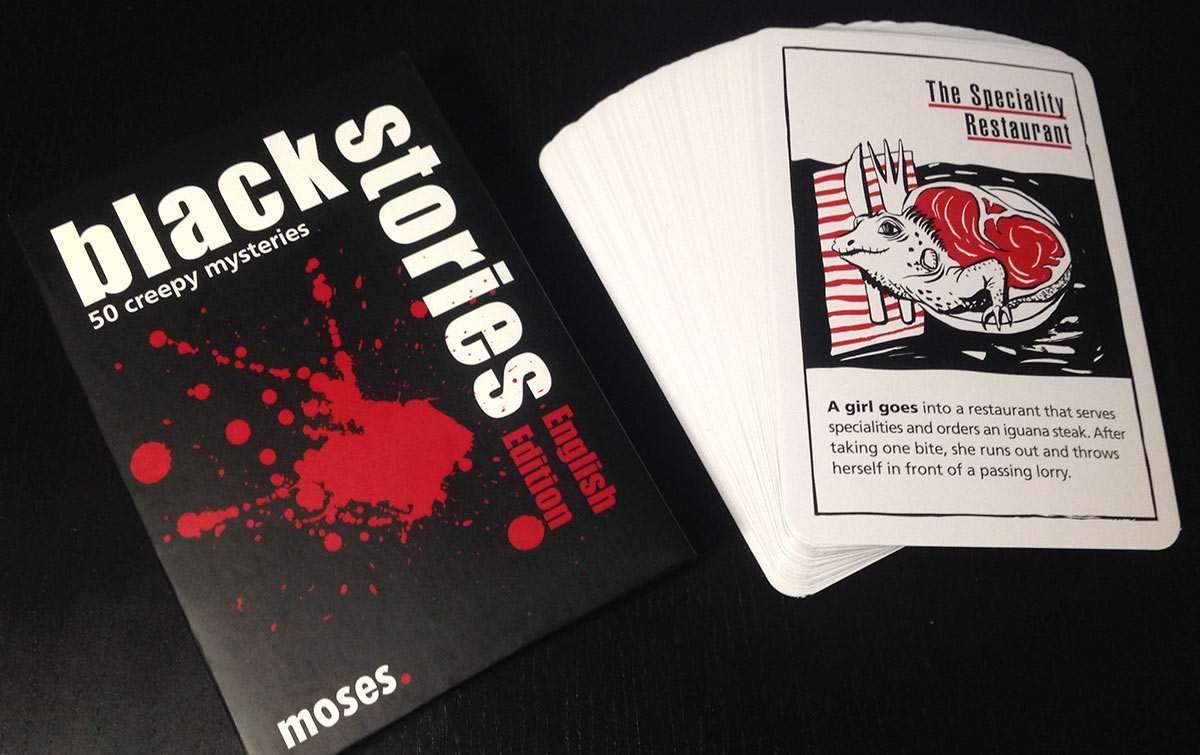
“Great!” I thought to myself. “Sherlock Holmes Consulting Detective on the back of a napkin? Sold!”
Except the stories in Black Stories are some of the most blisteringly shit mysteries I’ve ever encountered, made all the more mysterious by the amazing, overblown copy in the manual.
Holy shit!
And then you read a mystery, and… well, here’s one of them: “A woman decides to sell her husband’s new Porsche for a mere 500 euros.” Why?
The ghastly solution (truncated): “Her husband drove into the woods and committed suicide, the car wasn’t found for six months, and she couldn’t get the smell out.”
Here’s another one: “A woman gives a man something to eat. Some time later, both of them die.” That’s the mystery in its entireity. Never mind the fact that this is true of any food ever given to a man by a woman, the solution is even worse: “The man and woman were Adam and Eve!”
Let me just cut through the treacherous fog created by Holger Bosch’s warped and wicked mind, or possibly his arse. A good mystery or puzzle makes players feel clever as they see how your clues fit together in a moment of insight, and a great puzzle then brings on a second wave of joy as the players realise how clever the puzzle was. What we’ve got here is players nosing around uselessly, asking stupid questions and suggesting valid solutions until finally they stumble upon Bosch’s personal “correct” solution.
Which isn’t to say Black Stories is without merit. If you see it cheap, it’ll definitely get the conversation flowing more than any number of games designed to break the ice at a game night. It’s just going to annoy people. You’re paying money to be annoyed.

Step one: Buy Kobayakawa, a small Japanese bluffing game.
Step two: Be disappointed it doesn’t have the metal coins of the Japanese version. You kinda bought it for those coins.
Step three: Sit down to play Kobayakawa, which it turns out is a kind of poker/blackjack thing. Everyone gets the chance to replace the card they’re holding or replace the public card in the middle of the table. Everyone can then choose to ante a coin to reveal their card, and the lowest number gets the central hole card added to their total. The highest total gets all the coins put forward, plus one extra.
Step four: Endure a sense of gentle powerlessness. Are you having fun? It doesn’t feel like you’re having fun.
Step five: Stare out of the window. Remember that one girl from your childhood who always smelled of strawberries. Did she ever see you the same way? There was that one party where you just, like, sat and talked for hours, inching closer and closer until everyone else had gone to sleep. Does she ever think about that night, do you think? Or was her sexuality a burden she never asked for? Her catalogue of bright red smiles, each one forever burned into your mind… did they mean anything at all?
Step six: Dude it’s your turn
Step seven: Oh sorry. Shall we stop playing this? It’s not very good
Step eight: Yeah ok

Diamonsters is a combination of the word “Diamonds” and “Monsters”, because this is a game about monsters that eat diamonds! At least inasmuch as Love Letter is about getting a letter to a princess, anyway.
This is yet another new, simple game that’s ostensibly about bluffing. Players each get a hand of cards showing monsters numbered 1 to 5. Players then compete to grab a monster that’s turned over from the top of the deck. You all play a card of your choice from your hand, then reveal simultaneously. The highest number wins, except identical numbers cancel each other out. E.g., if three people play a 5, the person who played a 2 wins. And winning sees you taking not only the card in the middle, but the card you just played.
There are some extra rules, like a 1 always beats a 5 in a straight fight, and you win a round if you get three of the same monster in front of you OR you amass five of the diamonds printed on the monster cards. But basically this suffers from the same problem as Kobayakawa, in that actually thinking about your moves or the moves of your opponents doesn’t seem to improve your chances a great deal? And that’s fine! Some card games are just a silly boondoggle. But not the ones you pay £15 for.
The English edition of Diamonsters also has the single worst ratio of box size to box contents I’ve ever seen.
In fact, I’m so annoyed I’m going to do some MATHS. Where’s my tape measure.
Right. It’s a 23cm x 11cm x 6cm box, so 1518cm3. The contents are 11cm x 6cm x 2cm, so 132cm3. That’s a 1150% upscaling of the space they needed.
Well I won’t stand for it, IDW Games! You took 1,386 cubic cm out of my living room and I want EVERY SINGLE ONE OF THEM BACK or I’m going to upscale the space occupied by your ANUS BY 1150% and neither one of us would enjoy the process so please be reasonable

Sushi Go! is a little Australian card drafting game. Drafting is where everybody has a hand of cards, takes a card from it, passes what’s left around the circle and repeats the process, slowly building a collection of cards in front of them. Sushi Go! is themed around sushi going around and around a conveyor belt. It’s a great little design, where every round is a tricky decision.
Do you go for the wasabi, hoping you’ll draft some half-decent nigiri to put it on? Or do you take the tempura, which is useless unless you get a set? Nobody else has drafted any tempura, so it should be easy pickings… unless there’s none at all this round.. And anyway, shouldn’t you be denying them something of higher value?
Now, here’s the funny thing. 7 Wonders is a huge card drafting game that won all sorts of awards when it came out in 2010. A grand old card drafting monsterpiece with beautiful art and all sorts of nuance. We reviewed it back when we’d just started and loved it.
Since then, though, something funny’s happened. I bought the Cities expansion and we just… never reviewed it. Then we got sent the new, Babel expansion and… we never reviewed it.
And I was playing Sushi Go! last week and all I could think to myself was that it brought me all the joy of 7 Wonders, but with none of the cloudy complications or lengthy rules explanations. It was like I was eating ramen noodles at home instead of leaving the house for a fancy dinner, and I think I might have enjoyed it more. I’m still passing cards to my friends, thrilling at my gambles and regretting my hubris. I’m also not having to stop to explain a rule every five minutes.
So Sushi Go! wins the “Is This Better Than 7 Wonders?” Award, because it might be better than 7 Wonders. We don’t know.
Do you know?

